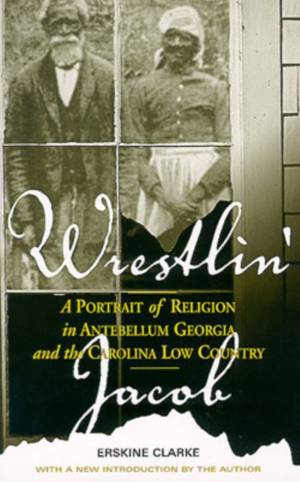
- Afhalen na 1 uur in een winkel met voorraad
- Gratis thuislevering in België vanaf € 30
- Ruim aanbod met 7 miljoen producten
- Afhalen na 1 uur in een winkel met voorraad
- Gratis thuislevering in België vanaf € 30
- Ruim aanbod met 7 miljoen producten
Zoeken
Wrestlin' Jacob
A Portrait of Religion in Antebellum Georgia and the Carolina Low Country
Erskine Clarke
€ 31,45
+ 62 punten
Omschrijving
An important introduction to the efforts of whites to evangelize African Americans in the antebellum South First published in 1979, Wrestlin' Jacob offers important insights into the intersection of black and white religious history in the South. Erskine Clarke provides two arenas--one urban and one rural--that show what happened when white ministers tried to bring black slaves into the fold of Christianity. Clarke illustrates how the good intentions--and vain illusions--of the white preachers, coupled with the degradation and cultural strength of the slaves, played a significant role in the development of black churches in the South. From 1833 to 1847, Reverend Charles Colcock Jones served as an itinerant minister to slaves on the rice and cotton plantations in Liberty County, Georgia. The aim of Jones, and of the largely Puritan-descended slave owners, was to harvest not only good Christians but also obedient and hard-working slaves. At the same time, similar efforts were under way in cosmopolitan Charleston, South Carolina. Charleston permitted blacks to worship only under the supervision of whites, and partially as a result, whites and blacks worshiped together in ways that would be unheard of later in the segregated South. Clarke examines not only the white ministers' motivation in their missionary work but also the slaves' reasons for becoming a part of the church. He addresses the important issue of the continuity of African traditions with the religious life of slaves and provides a significant introduction to the larger issues of slavery and religion in the South.
Specificaties
Betrokkenen
- Auteur(s):
- Uitgeverij:
Inhoud
- Aantal bladzijden:
- 252
- Taal:
- Engels
- Reeks:
Eigenschappen
- Productcode (EAN):
- 9780817310400
- Verschijningsdatum:
- 13/12/1999
- Uitvoering:
- Paperback
- Formaat:
- Trade paperback (VS)
- Afmetingen:
- 141 mm x 217 mm
- Gewicht:
- 353 g

Alleen bij Standaard Boekhandel
+ 62 punten op je klantenkaart van Standaard Boekhandel
Beoordelingen
We publiceren alleen reviews die voldoen aan de voorwaarden voor reviews. Bekijk onze voorwaarden voor reviews.







